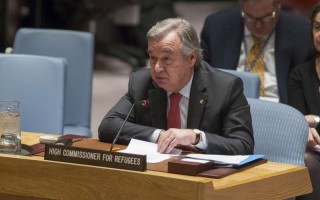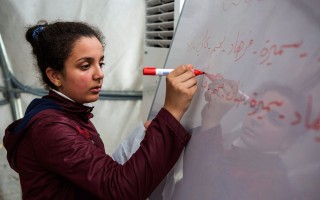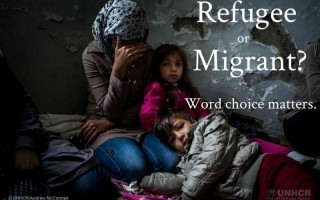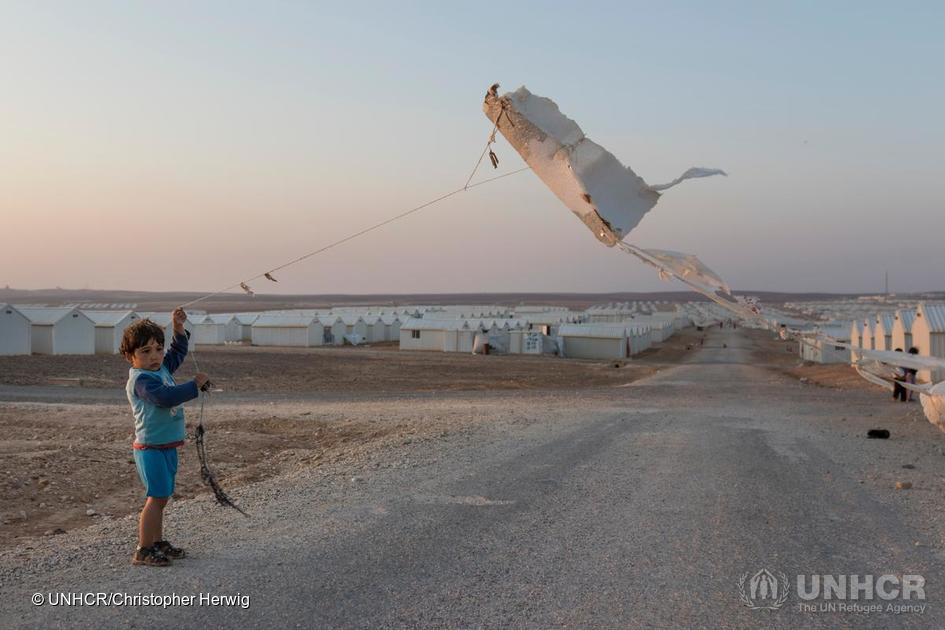
Jordan. Evening view over Azraq Camp. Young refugee boy from Syria flies a homemade kite made from a piece of insulation. © UNHCR/Christopher Herwig
This is a fictionalized account of a child’s experience during the ongoing conflict in Syria. It is based on true events and interviews with child refugees and their families as documented by UNHCR, the UN Refugee Agency in The Future of Syria: Refugee Children in Crisis unless otherwise cited.
My earliest childhood memory is being carried in my mother’s arm as we fled across the border. Much later, I was told that our house in Damascus had been destroyed by shelling. I cried when I found out. I hardly remember it, but I loved that house. It had beautiful flowers in the garden, and a courtyard that always smelled like oranges. It was big, too—I had my own room and there was another room for my older sister. Now everyone lives together in one room, and sometimes we have to live with strangers. It’s not the same. Sometimes I ask if we can go back to Damascus, but my mother always says the same thing. “Not until it is safe. If we go back now there is nothing for us but dust.”
The UN estimates that 2.5 million children have been forced from their homes by the war in Syria. 1.1 million are refugees, the rest are internally displaced persons (IDPs) still living in Syria.
When we left Syria, I was only four years old. Now I am eight, and it seems like my family has been running, waiting, and running again for my entire life. My older sister remembers Damascus so I know we were happy. She had a bicycle. My sister says we used to be rich because my father was a businessman. Now he is sad and sighs when he thinks we can’t hear—especially during special holidays when we can’t afford the treats and special foods for sale in the city. We are safe here in Jordan, but there is hardly any work for refugees, even those with university degrees like him. Sometimes when I am falling asleep I wonder what it would be like to be rich. I would like a bicycle. And a new house that smelled like oranges.
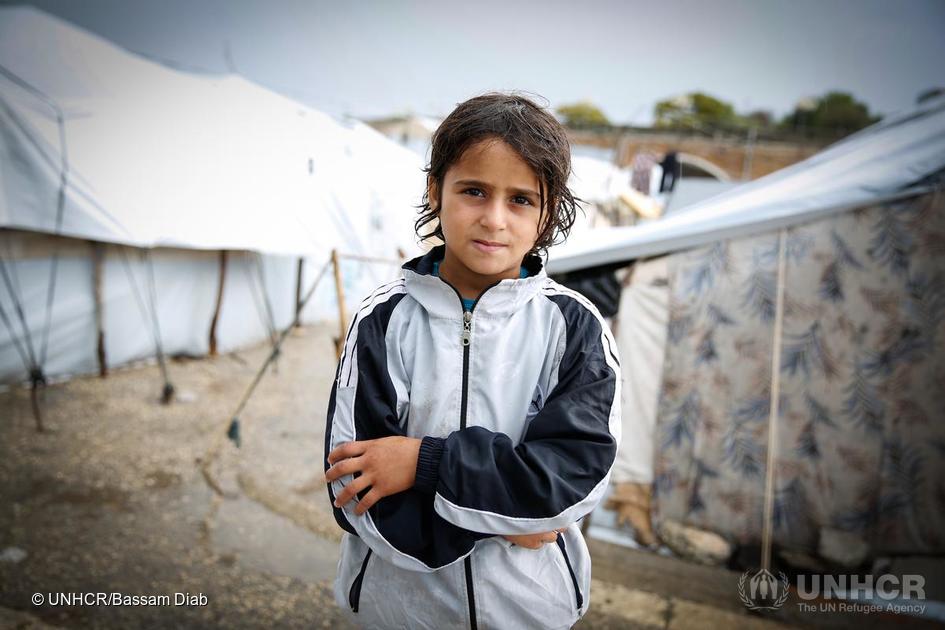
Internally displaced persons in Syria. Winter at Lattakia Shelter. Shaima, 8-years-old, displaced from Aleppo three years ago with her family of five. © UNHCR/Bassam Diab
Today is a wonderful day! A box of pomegranates was delivered to our apartment building. The money for the fruit came as part of a donation from somewhere far away. Canada, maybe? I try to remember the last time we had fresh fruit. It must have been over a week ago. It is a doubly wonderful day, because my mother was able to barter for a tiny piece of raha from the kind man who makes it in the Zaatari refugee camp. Raha is a type of candy that has always been popular in Syria. Biting into it, I eat not just sugar and nougat, but the happy-sad taste of the past. I think many people feel this way when they eat raha.
Many Syrian refugee families depend on humanitarian assistance to survive. They are living hand to mouth in extreme poverty, and only 20% of families report eating fruit at least once a week.
When we first left Syria, we walked for days. We slept on the side of the road. I had never been so cold in my life. Sometimes I cried, but when I did my mother would take me and my sister by the hands. She would smile, and brush away our tears, and tell us stories about adventurers who set off from their homelands to find a better life.
I liked being an adventurer, but sometimes it was scary. My sister remembers one night when a dark car pulled up beside our makeshift shelter. She had been so scared she’d left her blanket and crept up to sit with my father. The car window rolled down, and a man with a hard face asked if he could take my sister and I away with him. He offered my father money. My father woke us all, and that night we walked for miles across the countryside, away from the roads.
When we first arrived in Jordan, we lived in the Zaatari refugee camp. I remember rows and rows of tents. There were so many people there! From Damascus, from Homs, from all corners of Syria. When I hear stories from the other refugee children I know my family is very lucky. One of my new friends left her home after her mother was killed in an attack on their city. She shares her tent with a new family member: a little boy who has no parents at all.
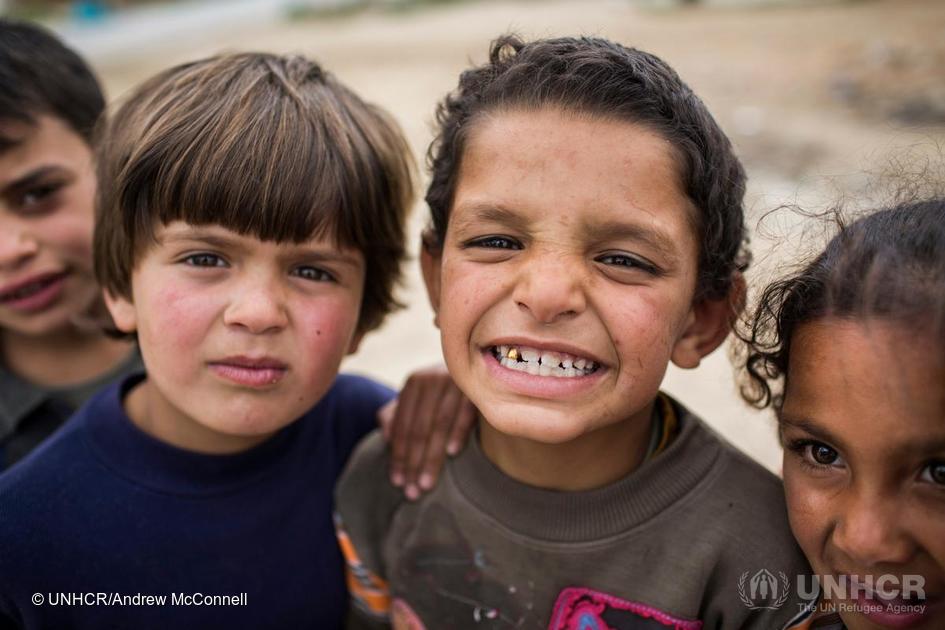
Omar, 7, shows off his gold tooth outside his shelter in the informal tented settlement of Fayda, in the Bekaa Valley, Lebanon. © UNHCR/Andrew McConnell
In 2013, UN researchers conducted interviews with refugee children in Jordan and Lebanon. One in four children interviewed said that at least one of their immediate family members was either dead, detained or missing.
Living in the camp was much better than life on the road. We were given mattresses, blankets, cooking stoves—everything we needed to get by until the war was over.
Years passed, and finally my parents decided it was time to start a new life as best we could. That’s when we moved out of the camp and into an apartment in the city. Our savings ran out a long time ago and life is difficult, but my parents are happy to be part of the local community. “We must stop thinking about the dust we left behind in Syria,” they tell us. “It is time to build a brighter future.”
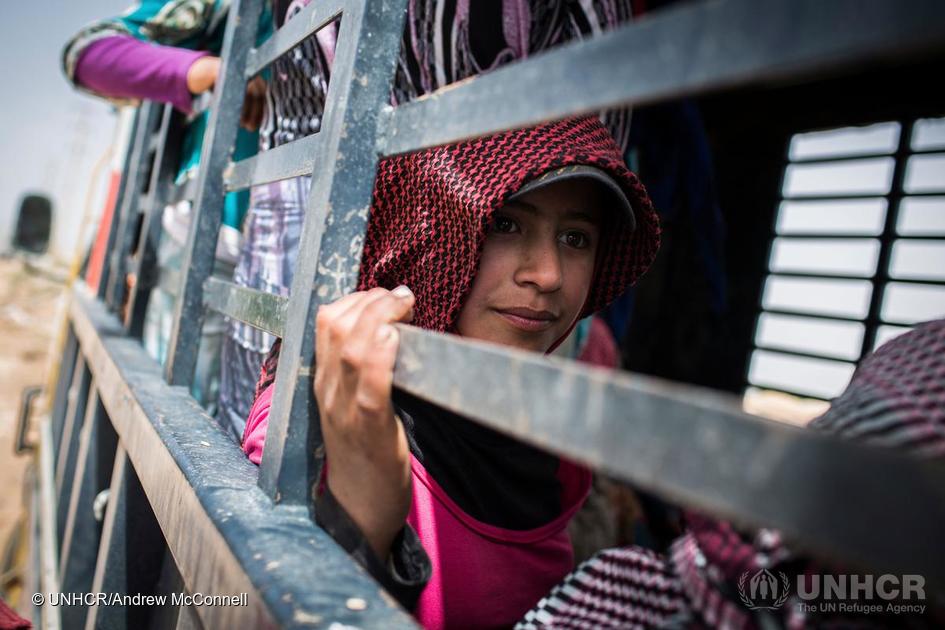
After a brief opportunity to eat some lunch Manar, 13, sits in a truck that will take her to work a second shift in a nearby potato field, in Fayda tented settlement, Bekaa Valley, Lebanon. © UNHCR/Andrew McConnell
Around 50% of refugee households in Jordan and Lebanon rely partially or solely on the income generated by a child. Despite the exceptional efforts of governments, international agencies, and donors, more than half of all school-aged Syrian children in Jordan and Lebanon are not in school.
Today I am so excited. I am going to go to school! Until now, I spent most of my days inside. “It is to protect you and your sister,” my mother explains. I nod, but I am so bored and lonely trapped in this tiny apartment all day. I am so happy. I know many refugee children are not able to attend school, but now the local classes are running double shifts and we don’t even have to pay!
My sister and I will go together. Some of the other girls in our building are already working to support their families, but my father believes nothing is more important than education.
“When the war is over,” he says, “my girls will make the world a better place.”



